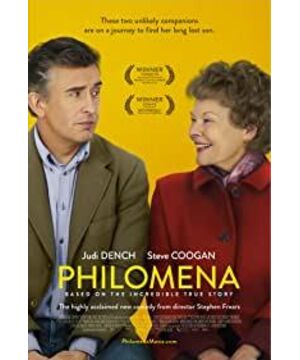The content of the story will not be repeated. Several themes that the film wants to express, such as maternal love, religion, and the change of the hero Martin throughout the interview process, rub together very well. Some people think that the shallow part of the film is to show Philomena's great maternal love, while the deep part is a condemnation of the narrow religion represented by the nuns. And I think what the film wants to express is not so much a layered theme, but an objective comparison of maternal love and religion together. In other words, the values held by Philomena, Martin, the nuns, and each other character are displayed on the screen, and which of them is good or bad, the film does not clarify, but we as spectators have the answer. Of course.
For the nuns, women who stole the forbidden fruit are absolutely unforgivable, so forcing the girls to separate from their own flesh and blood, punishing them for hard labor, and preventing the reconciliation of mother and son after many years, the abstinence nuns see it as a disservice to the girls. Punishments for crimes committed are reasonable and justified. What they do is unreasonable and inhumane to most people, including the protagonist Martin, and betrays the principle of religious fraternity. But what's interesting is that Philomena, who should have hated the nuns the most, flatly forgave them at the end. I think the reason for this is not only because of Philomena's great love, but also because of her fascination in the monastery when she was young. The teachings of religion were in her blood, and she also considered herself guilty of stealing the forbidden fruit when she was young. Martin once wanted to change her sense of guilt, but she insisted that "it is her sin to give birth to Anthony, but it is her responsibility to find Anthony." It can be seen from this point that Philomena and the nuns believe in this. Fifty years of separation is an atonement for the impulses of youth. Even if Martin and we, the spectators, can't understand it, this kind of thinking penetrates their bones and is their truth.
Martin's attitude is the attitude of our ordinary spectators, and his transformation and growth in the interview precisely represent the change of the audience's attitude. When Martin met Philomena for the first time, he scoffed at her somewhat ignorant conversation and the somewhat awkward atmosphere of the conversation. Like the audience, he didn't know what kind of news breaking point this ordinary little old lady in front of him could bring him. The scene at the airport and the scene at the hotel also fully demonstrate the ignorance of Philomena, a country grandmother from Ireland, and the disdain of Martin, a former important official of the British government. But slowly, Martin discovered a "true" power in Philomena. It is her broad knowledge that keeps her complimenting and enjoying all the good things in life. She chatted with the Mexican chef, she was fascinated by the simple and innocent love story, and her compliment to anyone who was friendly to her was "one in a million." Slowly, Martin realized this innocence but firmness The indestructible power allowed her to finally knock on the door of her son's ex-lover and let her say "I forgive you" to the nun in a calm tone when Martin was furious. Compared with Philomena, Martin's seemingly The means of the accident and the self-righteousness of the past seem a little pale. As viewers, we initially looked down on Philomena like Martin, but as the film progressed, our attitude towards her turned to be moved and respected. And at the end of the film, when we, like Martin, are mad about what the monastery has done, Philomena's attitude is unexpected, but her line "I don't want to hate anyone, look at you, it's too tired." ," but hit our hearts like a gentle punch. At this moment, Philomena's realm overwhelmed us.
Finally came Philomena. Aside from the good and bad qualities of her rusticity and innocence mentioned above, she is just a mother. What she did in the film was just her uninterrupted miss for her son and persistence in the process of finding him for fifty years. I think this is what every ordinary mother can do. The great thing is not just her alone, but the feeling of maternal love. Maternal love does not require all kinds of rules and regulations like religion. Ferrolina's love for Anthony lies in her respect for all his choices; she lingers on all the tiny details of her son's life; she sheds tears for her son's achievements, and she blesses her son's love. Even though her love for him has been blocked for fifty years, she knew at the first sight of Anthony's photo that it was the angel she lost a long time ago. If I say, maternal love is a greater existence than religion. She is omniscient, she is all-encompassing, she is gentle and powerful, and she never stops. And if it is further sublimated, Philomena represents not only a mother's love, but a kind of fraternity. If the nun represented the narrow favor of God and Martin represented a somewhat cynical hatred, in Philomena we see nothing but love as pure as her character. This love is not only for her son, but also for everyone around her. She does not dwell on the past, she forgives those mistakes that have been made but cannot be undone, and she embraces this world that is not fair to her with her optimistic heart. After watching the whole film, Philomena really didn't hate anyone, including the man who killed her all her life. She was always talking about his handsome appearance and every second of happiness that night. For fifty years, her life has been difficult but not painful, just because she has a heart full of love.
The final ending of the film seemed bland. The director did not have a subjective preference for which character's attitude, but let these values collide violently in the last ten minutes, making the old nun tremble in anger and making Martin believe in Philomel. The power of fraternity in Na, a devout believer, made Philomena finally find Anthony's cemetery, leave satisfied, and devote herself to the next cheap romance novel with a "100% unexpected ending". The film converted to her broad mind, and her life opened a new chapter. Off-screen audiences, however, already have roughly the same judgment on the values of these characters.
In this society, we always feel that the people around us are as paranoid and unreasonable as nuns, and we are either scornful or cynical like Martin, but if there are more people like Philomena around us, will there be more rays of sunshine in our lives? . Choose different perspectives, everyone has their own life, but you can't deny that love will really bring you more power than hate.
View more about Philomena reviews











